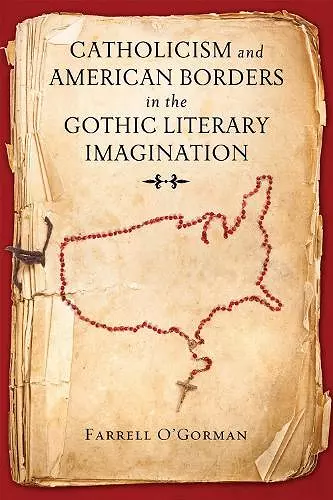Catholicism and American Borders in the Gothic Literary Imagination
Format:Hardback
Publisher:University of Notre Dame Press
Published:15th Nov '17
Currently unavailable, and unfortunately no date known when it will be back

In Catholicism and American Borders in the Gothic Literary Imagination, Farrell O'Gorman presents the first study of the recurrent role of Catholicism in a Gothic tradition that is essential to the literature of the United States. In this tradition, Catholicism is depicted as threatening to break down borders separating American citizens—or some representative American—from a larger world beyond. While earlier studies of Catholicism in the American literary imagination have tended to highlight the faith's historical association with Europe, O'Gorman stresses how that imagination often responds to a Catholicism associated with Latin America and the Caribbean. On a deeper level, O'Gorman demonstrates how the Gothic tradition he traces here builds on and ultimately transforms the persistent image in modern Anglophone literature of Catholicism as "a religion without a country; indeed, a religion inimical to nationhood." O'Gorman focuses on the work of J. Hector St. John de Crèvecœur, Herman Melville, Kate Chopin, William Faulkner, Flannery O'Connor, Walker Percy, Cormac McCarthy, and selected contemporary writers including Toni Morrison. These authors, representing historical periods from the early republic to the present day, have distinct experiences of borders within and around their nation and hemisphere, itself an ever-emergent "America." As O'Gorman carefully documents, they also have distinct experiences of Catholicism and distinct ways of imagining the faith, often shaped at least in part within the Church itself. In their narratives, Catholicism plays a complicated and profound role that ultimately challenges longstanding notions of American exceptionalism and individual autonomy. This analysis contributes not only to discourse regarding Gothic literature and nationalism but also to a broader ongoing dialogue regarding religion, secularism, and American literature.
"Farrell O'Gorman's new book sets for itself an ambitious goal: It defines and illustrates a new paradigm for reading many major fictional narratives both within and outside the canon of American literature. . . . O'Gorman's book is a bold, indispensable and revisionary text for the benefit of readers and critics of major and dominant motifs in the unfolding history of American fiction." —America
"O'Gorman makes the bolder claim that Catholicism looms larger in the American Gothic than has been recognized, and that its presence there must be understood in relation to a desire to maintain well-defined borders, not only between nations, races and individual selves, but also between reason and passion, spirit and matter." —Flannery O'Connor Review
"This study is the first to explore in detail the importance of Catholicism to American Gothic. That this has not been done before is something of a scandal, and O'Gorman fulfills this need brilliantly. As the examples of Faulkner and Melville show, the Catholic shadow in American literature can be found in works by Protestant or secular writers. O'Gorman of course includes expected Catholic writers who are engaged with the traditions of their faith, such as Flannery O'Connor and the convert Walker Percy; but there are other writers whose Catholicism has seldom been considered relevant: J. Hector St. John de Crèvecoeur, Kate Chopin, and Toni Morrison, among others. In every case O'Gorman's nuanced readings provide unexpected insights." —Charles L. Crow, author of History of the Gothic: American Gothic
"A unique approach that opens up a fresh direction for American Gothic studies, with strong and original readings of key texts." —Stephen Matterson, Trinity College, Dublin
"Farrell O'Gorman's original scholarship investigates an area that has been almost altogether untouched by critics: the Gothic figuration of Catholicism within American literary culture. In this way, it has a strong resonance with studies like Toni Morrison's Playing in the Dark, in that it treats the Catholic presence (as Morrison does the Africanist presence) as thoroughly constructed by writers in order to serve a variety of purposes related to the establishment of American identity, especially with regard to border crossings." —Christina Bieber Lake, author of The Incarnational Art of Flannery O'Connor
ISBN: 9780268102173
Dimensions: 229mm x 152mm x 22mm
Weight: 670g
338 pages